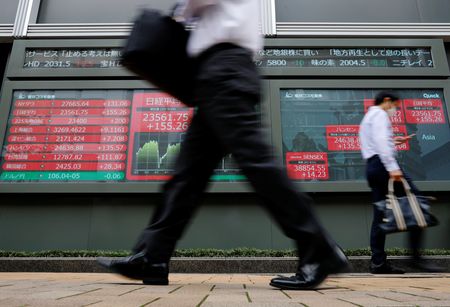 1
1 1
1

By Wayne Cole and Danilo Masoni
SYDNEY/MILAN (Reuters) – World shares rose on Monday and the dollar was pinned near five-week lows on hopes of an eventual slowdown in U.S. monetary tightening following sharp interest rate hikes in June and July.
Helping to mellow the mood was news that Shanghai authorities would cancel many restrictions on businesses resuming work from Wednesday, easing a city-wide lockdown that began two months ago.
The MSCI’s benchmark for global stocks rose 0.6% to its highest in more than four weeks by 0745 GMT, driven by a positive open in Europe and strong gains in Asia overnight. The index is up 0.4% so far this month.
The pan-European STOXX 600 equity benchmark gained 0.7%, while Japan’s Nikkei added 2.2% and Chinese blue chips firmed 0.7%.
Although Wall Street will be shut for the Memorial Day, U.S. futures were trading. S&P 500 e-minis rose 0.9%, having rallied 6.6% last week in their best run so far this year, while Nasdaq e-minis added another 1.3%.
Investors have seized on hints that the Federal Reserve, once it has hiked aggressively over the next two months, might then slow its tightening.
“Talk of a pause in the Fed rate hike cycle is doing wonders for everything ranging from equities to bonds and – unfortunately – commodities too,” said AFS Group analyst Arne Petimezas in Amsterdam.
“Over the past few weeks about 50bps has been lopped off from Fed terminal rate pricing. Predictably, Fed pricing suggests the Fed will shift a gear lower after the annual Jackson Hole retreat in August,” he added in a note.
The chance of a less hawkish Fed was enough to see Treasuries rebound, with 10-year note yields just above a six-week low at 2.743%. That is down from a peak of 3.203% on May 9.
The steadier market mood has seen the safe-haven dollar and yen decline, while the euro was boosted by hawkish comments from European Central Bank (ECB) officials who have been flagging a rate hike as early as July.
“U.S. economic data appear to be slowing, ECB officials are debating even faster initial rate hikes, and front-end rate differentials have started to move in the euro’s favour,” noted Goldman Sachs analyst Zach Pandl.
“A sharp slowing in the U.S. economy – if not matched by similar weakness in Europe – could result in a meaningful euro rebound, though the reverse is also true if U.S. data hold up better than expected,” Pandl added. “We see downside risks to U.S. growth, and have recommended USD/JPY put options to express this view.”
That underscores the importance of this week’s major U.S. data, which includes the ISM survey of manufacturing on Wednesday and the May payrolls report on Friday.
Payrolls are forecast to rise a solid 320,000, though that would be down from April, with unemployment at 3.5%.
The euro rose to a five-week high and was last up 0.2% at $1.0750, having risen 1.6% last week. The dollar index fell to a fresh five-week low of 101.38 and was last down 0.2% at 101.50, after shedding 1.3% last week.
China’s offshore yuan rose 0.85% after hitting a one-week high of 6.6548 per dollar.
The pullback in the dollar helped gold off its recent lows, sending the metal up 0.5% at $1,862 an ounce.
Oil prices have been supported by expectations for stronger demand as the U.S. driving season gets under way, and as European Union nations negotiate over whether to impose an outright ban on Russian crude oil.
The EU failed on Sunday to agree on an embargo of Russian oil, but diplomats will still try to make progress ahead of a Monday-Tuesday summit.
Brent rose 0.4% to $119.90 per barrel, while U.S. crude gained 0.6% to $115.72 per barrel.
(Reporting by Wayne Cole in Sydney and Danilo Masoni in Milan; Editing by Sonali Desai)